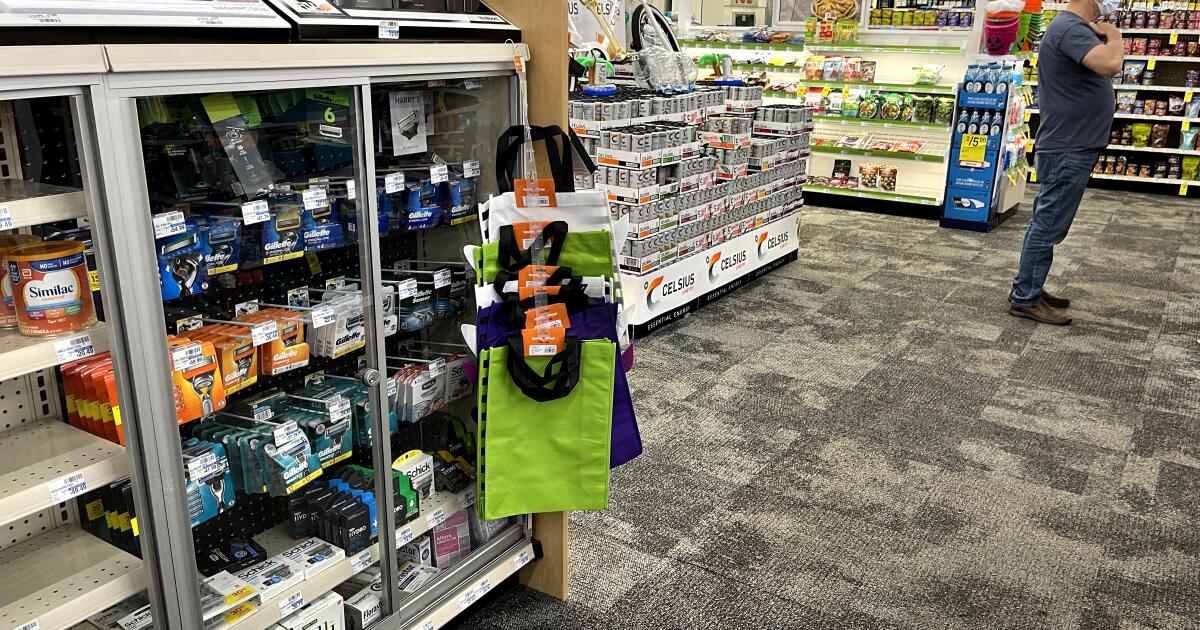A majority of likely California voters support stiffer penalties for crimes involving theft and fentanyl, according to a new UC Berkeley Institute of Governmental Studies poll co-sponsored by The Times.
The results of the poll released Friday showed that 56% of Californians would support Proposition 36, an initiative on the November ballot that would impose stricter sentences for repetitive theft and offenses involving the deadly drug fentanyl.
The proposition has been at the center of a battle in the state Capitol this year as Republicans and law enforcement advocates call for the undoing of Democratic reform policies that downgraded some felonies to misdemeanors, which they blame for an increase in organized retail theft and “smash and grab” robberies.
The poll also gauges how voters feel about initiatives designed to respond to California’s high cost of living. According to the poll, a majority of likely voters support a measure to increase the state minimum wage to $18 per hour, though those surveyed were more divided over a measure that would embolden local governments to expand rent control but still lean toward “yes.”
The broad support for Proposition 36, the tough-on-crime measure, comes as Gov. Gavin Newsom and state Democrats try to balance frustrations about crime among Californians with criminal justice reform goals that voters once supported.
The initiative aims to overhaul parts of Proposition 47, a measure approved by voters a decade ago that downgraded some crime penalties in an effort to reduce the state’s prison population and offer nonviolent offenders more chances at rehabilitation and freedom.
Mark DiCamillo, director of the Berkeley IGS Poll, a nonpartisan survey of California public opinion, noted the “great visibility” of retail theft crimes — caught on camera or witnessed by voters in their communities — as a possible reason why more than twice as many voters said they support Proposition 36 than those who don’t.
“It’s kind of outrageous to voters, what they’re seeing, and they’re linking it to the approval of Proposition 47,” DiCamillo said.
Becky Warren, a spokesperson for the Yes on Proposition 36 campaign, said that the poll “confirms that Californians want real solutions to address our homelessness and drug crises” and that the measure will ensure that “repeat offenders face accountability and consequences.”
While advocates of the GOP-backed measure — which has garnered support from some Democrats including San Francisco Mayor London Breed — see it as a solution to some crime, opponents said it will lead to a costly rise in the state’s prison population.
Newsom and Democrats attempted to craft a rival ballot measure this summer that would have addressed crimes like shoplifting with a less punitive approach than the prosecutor-driven Proposition 36. That measure, though, was abruptly abandoned by the governor last month amid chaotic deal-making in the Capitol.
Anthony York, a former spokesperson for Newsom who now serves as a spokesperson for the No on Proposition 36 campaign, said he’s confident that as election day nears, and voters better understand the nuances of the initiative, they will change their minds.
“It’s really about bringing back the war on drugs; re-criminalizing drug possession and wasting billions of dollars on prisons and jails with zero way to pay for it,” York said. “Quality-of-life issues are important, understandably. People want and deserve to feel safe in their own communities. But they also don’t want bad policies that are going to ruin lives and take us backward.”
Likely voters also support Proposition 32 to increase the California minimum wage to $18 per hour from the current rate of $16, with 52% inclined to vote “yes,” according to the poll, and 34% intending to vote “no.” The remaining voters polled are undecided.
The measure is backed by Joe Sanberg, a wealthy Los Angeles investor and anti-poverty activist, and comes as unions have won raises for individual industries, securing $25 an hour for healthcare workers and $20 an hour for fast-food workers.
Several cities including West Hollywood and Berkeley have moved ahead of the state minimum and already pay more than $18 an hour. Proponents of the measure say that pay should be more uniform across the state, while business groups oppose it over concerns that it will collapse companies that are already struggling financially.
On Proposition 33, a measure that could expand rent control, 40% of likely voters said they would support the initiative, while 34% are opposed. The measure would give local jurisdictions in California more power to regulate rent and would repeal a law that bans localities from capping prices on some properties.
The measure is sponsored by the AIDS Healthcare Foundation, a Los Angeles nonprofit that has backed similar rent control initiatives in the past, and is opposed by the real estate industry, which warns it could cause developers to build less — a problem that could worsen California’s housing crisis.
Ten measures in total will be on the November ballot. DiCamillo said that with a high-stakes presidential election, political excitement could trickle down and draw record attention to propositions that could significantly change California policy.
“I’m expecting a big turnout, and usually that is beneficial to the issues lower down on the ballot,” he said.
Times staff writers Anabel Sosa and Andrew Khouri contributed to this report.
